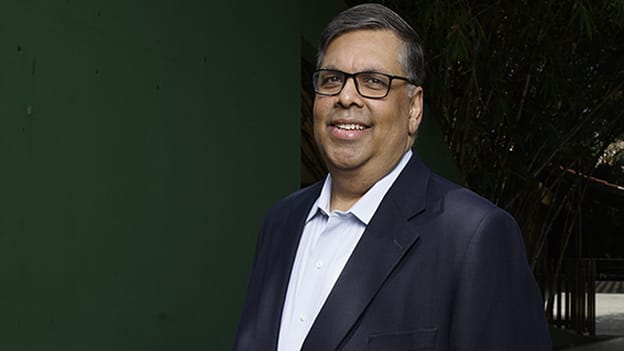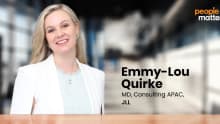Leaders who incorporate ‘resilience’ as a design element will experience greater success: President & CHRO - Wipro

READ the November 2021 issue of our magazine: Well-Being By Design
The pandemic has wiped out many long-held beliefs of employers and altered employee preferences for good. The pandemic has impacted employer-employee relationships differently across different industries globally. Employee attitudes towards work and employment have changed significantly during the pandemic. The hybrid mode of work, which most employers have embraced, is not just about providing flexibility but also a strong signal about inclusivity, promoting equity and embracing diversity. Companies that espouse and practice an inclusive and diverse culture are likely to be more successful than others, says Saurabh. President & Chief Human Resources Officer at Wipro, Saurabh is also a member of the Management Team. In this role, he leads all Human Resources functions for Wipro. Despite having over three decades of experience Saurabh still considers himself as a newbie who constantly maintains a child-like curiosity to learn new things. Before joining Wipro, he worked in organisations such as ITC and GE.
Here are the excerpts of the interview.
How do you see the current IT industry landscape and what are some of the significant trends that are transforming the tech industry?
Restrictions during the pandemic accelerated technology adoption by consumers. People are now more comfortable interacting with the world on digital platforms. Similarly, the pandemic exposed vulnerabilities in our supply chains and organisations will be moving to build robust arrangements for the future. Organisations have re-imagined physical workspaces, re-evaluated real estate costs as well as personnel policies.
It is with this backdrop that we need to understand how these are impacting the technology world. There is an unprecedented move to digital platforms. There are estimates that greater than 85% incremental spend will be in digital. However, the competitive advantage will be in moving fast. Hence speed is the mantra.
Cloud is a priority for organisations and with increased threats, cyber-security remains top of mind for senior leaders. We believe that growth will be dictated by next-gen technologies and services such as 5G, Robotics, Blockchain, Digital Strategy, Consulting etc.
Another trend we see is that clients want to work with partners whom they can ‘trust’ in their journey of digital transformation. The most important lever to build trust is impeccable execution.
Finally, we are seeing that demand for consulting and new technology skills is outstripping the supply. We see this situation in the foreseeable future. Talent shortages are real and can jeopardise the industry.
The role of HR leaders has changed and they have a lot on their plates. How are business expectations from HR especially in the IT industry changing?
Talent remains a source of competitive advantage. Changing work expectations, the great resignation era, changing work attitudes, talent skills gap, hybrid working are changes that have happened in the past 12-18 months.
MORE FOR YOU...
- #LeadersSpeak: Rapid-Fire with El Cavanagh-Lomas of Cisco
- Measuring and delivering 'impact' of well-being programs
Today the biggest expectation that business leaders have from HR is to help them manage these variables and deliver superlative employee experience. From this primary expectation emerge expectations such as enabling new work models, cultural integration, integrating technology to generate insights: HR analytics, reskilling and upskilling talent-at-scale, building next-gen performance management systems and more.
Delivering on the aforementioned expectations in an industry that experiences a huge churn every quarter and that too in a remote environment requires new ways of thinking and working from HR leaders. That is also an implicit expectation usually not overtly stated by business leaders. Business leaders are no longer looking for the standard suite of HR services. They want HR to partner in their transformation journey so that they (business leaders) can partner in the clients’ transformation journey.
While COVID-19 wrought havoc across the globe, it offered us an opportunity to reimagine work, workforce and workplace and build an inclusive world of work. Are we moving in the right direction?
The pandemic provided organisations with an opportunity to understand their practices with regard to diversity and inclusion. In certain cases, the pandemic impacted the livelihood of people who were in remote unfriendly jobs. Whereas in many cases employees sensed an improvement in their conditions due to lesser commute times, spending more time with family. Persons with disabilities or people with health conditions could participate in the workforce due to remote working.
In our industry, thanks to it being poised for remote working, the focus on diversity and inclusion got sharper. We are moving in the right direction. However, this is a complex issue and hybrid working will further add to the complexity. As companies now experiment with hybrid arrangements, they need to carefully redraft and repurpose people practices. When all are working remote, policies and decisions can be applied uniformly however when different work arrangements are implemented, we need to ensure that equity-enhancing measures are put in place.
What’s your take on the traits that will distinguish highly successful companies in the transition to the post-pandemic workplace?
During the pandemic, companies that have come out strongly are the ones that have displayed empathetic and resilient leadership.
As we hypothesise a post-pandemic scenario one wouldn’t be too off to say that hybrid and flexibility will emerge as cornerstones of any employment arrangement. Employee attitudes towards work and employment have changed significantly during the pandemic. Hybrid is not just about providing flexibility but also a strong signal about inclusivity, promoting equity and embracing diversity. Companies that espouse and practice an inclusive and diverse culture are likely to be more successful than others.
The uncertainties of a post-pandemic workplace demand resilience from employers more than ever. Being able to bounce back from setbacks would be a critical aspect to consider. Leaders who build resilient organisations by incorporating resilience as a design element will experience greater success.
Organisations that focus on employee well-being and push the meter on employee experience will be successful ones. Also, an unflinching commitment to the community within which they operate. During the pandemic, we saw organisations step up to avoid a humanitarian crisis. Employees and society at large have welcomed these gestures.
Trust is the currency of the future. Trust of the client and trust of employees. Trust in an organisational setup is gained through impeccable delivery standards and making good on commitments. Organisations that remain committed to building trust in an otherwise uncertainty fraught environment are likely to be more successful.
Finally, embracing technology and being open to a workforce ecosystem comprising contingent workers along with bots will distinguish leaders. Old ways of working will need to be discarded and technology-based solutions will have to be welcomed.
How do you think the events of the last year have permanently reshaped the relationship between employers and employees?
The pandemic has broken many long-held beliefs of employers and altered employee preferences for good. If we look across the globe, we can observe that the pandemic has impacted employer-employee relationships differently across different industries.
Work-life balance, flexibility, lower commutes along with meaningful work, empathetic leadership are taking center stage for all the right reasons. Take for instance Wipro, over 95% of our workforce continues to work from home. None of the new joiners in the past 18 odd months have seen Wipro offices. Yet we are able to deliver flawlessly in a remote set-up.
With hybrid work, multi-generational workforce and alternate work arrangements the employer-employee relationship is going to be different for different employee segments. With lines between work and personal life getting blurred, the relationship is likely to be based on mutual trust and a common future. Employees will want to work with organisations that fit in their lifestyle which could include flexibility, learning, well-being or all of these and even more.
How are you reinventing your HR function? Are you employing next-gen technologies such as AI, blockchain?
Growth in IT services will be driven by next-gen technologies. We are already seeing multiple applications of these technologies that are driving radical changes in the way we operate. Work and the workplace are getting transformed by these technologies. For instance, digital technologies have transformed the way we connect and collaborate at work. The most impactful example is the pandemic.
At Wipro, our focus is on adopting technologies for creating an enhanced employee experience. Let’s take AI as an example. There are significant advances made in narrow AI. We shall increasingly see AI-enabled decision making within organisational processes. At Wipro, we are using AI as part of our performance management system to help employees write sharper appraisals and reach better performance outcomes. It is also part of the talent review planning system that helps employees chart their careers. We have extensively used RPA in our shared services transformation. HR analytics is another area that we are transforming with next-gen technologies.
Several studies find that CEOs prioritise well-being as they prepare to move forward. But putting that into practice can be difficult. What’s your take on how can organisations embed well-being by design?
Any change that requires us to change our work habits and work values will be difficult to implement. Hence when it comes to embedding well-being by design it needs to happen at two levels.
Firstly, at an individual level. At Wipro, our Chairman is personally leading a culture transformation and behaviours that promote well-being are very much part of this transformation. As a leader when you prioritise well-being, it sends a positive signal to the entire organisation. Leaders have not only been vocal in communicating about wellbeing but also taking action on the same; we call it the Say-Do ratio. A powerful example is that due to the pandemic and movement restrictions we saw employees not taking leaves. Our leaders communicated the importance of taking breaks and led the way by taking a few days off every quarter and will continue doing so.
Secondly, role modelling should be further supplemented with policy frameworks and processes. At Wipro, we have an extensive framework that looks at well-being at many levels such as emotional, financial, social etc. This framework is continuously reinforced through different communication platforms and supported by a set of policies and processes which make it accessible to all. The focus should be embedding wellbeing in performance management processes and the total rewards program.
The pandemic has been an impetus for innovation. What have been the biggest lessons COVID-19 has highlighted in terms of the culture of innovation?
Pandemic has shown that collaboration and exchange of ideas can fuel innovation exponentially. At the global level, we saw scientists collaborating to come out with not one but multiple vaccines in record time. Free exchange of ideas, working across boundaries, failing fast and then succeeding, celebrating others’ successes are hallmarks of an innovation culture. If we look at organisations, going virtual was not an easy task. It demanded a drastic departure from well-entrenched procedures and comforting habits. It required an almost overnight change of working model. At Wipro, this was successful because of an openness to experiment with new ways of working. This openness was matched with an equal measure if not more of persistence.
For us, the realization is that a culture of innovation stands firmly on values of sharing, openness, respect and trust. A culture that embraces agile decision making and tolerates failures is a must for innovation.
What is your talent management equation with the Great Resignation gaining steam globally? Can you share light on your strategies to attract and retain talent amid all the chaos?
Great Resignation in an era when unemployment is high. Paradoxical isn’t it! The pandemic has changed the way people visualise their priorities. Flexibility, health, relationships, work-life balance are taking center stage and for all the good reasons. This has led to people re-evaluating their current employment and gravitating more towards employers that align with the new value systems
Closer home I am not sure if the current talent shortages can be termed due to the Great Resignation Era since at least in the IT industry we see people moving to similar companies. Also, the reality may be different in different countries based on employment opportunities, income levels and standard of living.
Having said that important thing to note is that it offers employers an opportunity to introspect and re-examine some of our long-held beliefs about work. If burn-out, travel commutes, uninspiring work, work-life balance are the causes then they need to be addressed.
At Wipro, we have moved to the hybrid work arrangement offering people flexibility. Our learning systems are anywhere anytime – again offering flexibility and freedom. We have a deep focus on diversity and inclusion.
We have brought in policies such as breaks from work giving employees extended time off to pursue leisure interests. This is in conjunction with our sabbatical policy that provides employees extended time off for studying.
We have also created opportunities for our employees to contribute to the communities they live in. The idea is to create a balance between organisation and employee needs and address core issues via systemic solutions.
The biggest question for executive leadership today at several corporations is envisioning the future of work post-pandemic. How are you doing it?
Pandemic has challenged some of our long-cherished beliefs about work. Most large organisations today are talking about a hybrid work arrangement.
To my mind hybrid workplace is the integration of what were the best elements of the old workplace with new ways of thinking. It is as much an abstract concept as it is a physical experience. It offers employees to have a more tactile experience of the workplace culture, practices, rituals and build the required social capital through physical interactions. It is also about reimagining the physical workspace to create the outcomes of a hybrid workplace i.e collaboration, innovation, stickiness and socialisation.
At Wipro, we believe that the future will consist of a workforce eco-system comprising traditional workforce, contractors, retainers, gig workers and even bots. We definitely see value in people coming back to work. In the immediate future, our actions will be guided by employee safety, government regulations, pandemic protocols while not compromising on client delivery. In the long run, we postulate a hybrid workplace that provides employees flexibility yet anchors them to the organisation. We will have no one permanently working from home: it's important for teams to come together at regular intervals. We have a blueprint ready to implement return to work for employees working from client and Wipro offices. For now, we have senior, fully vaccinated colleagues visiting our India offices twice a week. Results have been very encouraging, to say the least.















